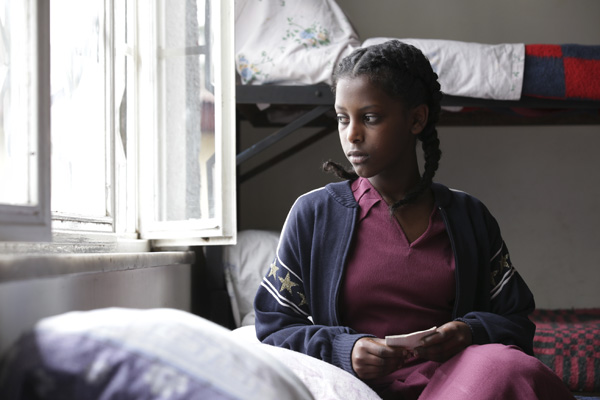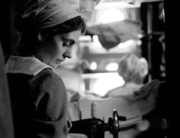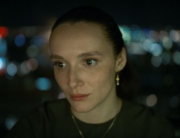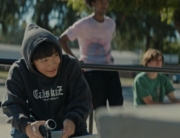Based on real events, the story portrayed in this layered film occurs in 1996 in Ethiopia, just three years after women were granted equal rights under the law. In the capitol city of Addis Ababa, social services have been established to assist women and girls, including free legal aid. Meaza Ashenafi (Meron Getnet) heads the Adinet Women’s Lawyers Association, successfully advocating for women and children who reside within the city. Outside of the city, however, the law becomes muddied in the face of long-standing village traditions, and providing legal assistance is not only difficult, but dangerous.
In one such village, 14-year-old Hirut (Tizita Hagere) lives with her family and attends school. She is attractive and physically mature for her age, but she has no interest in marriage. She has seen what happened to her older sister, who was, by accepted village custom, abducted by her future husband when she was of marrying age. He turned out to be a drunk who leaves her to attend to their four children on her own.
Hirut wants to do well in school and attend university. She has just learned that she is being advanced to the fifth grade when, on her way home from school, she is grabbed by a group of men on horseback and taken to a remote cabin. One of the men beats and rapes her, then announces she is to be his wife. When he leaves his gun in the hut, Hirut, left alone, seizes the opportunity to escape. She attempts to sneak past the men, but is caught, and in fear, she shoots the man who raped her. The rest of the men try to kill her, but civilian police intervene and Hirut is taken to jail.
Meaza travels to the police station to provide legal assistance to Hirut, but she encounters resistance from the start. Both the police and local assistant district attorney refuse to allow her to take Hirut away for needed medical care. They consider her to be a murderer and are adamant that she is of legal age (18) to face the full consequences for her actions. Hirut’s father further complicating Meaza’s efforts. He fears publicity would endanger the rest of his family if he allows Meaza to defend his daughter.
Frustrated at every turn, and cautioned that no woman has ever been awarded a self-defense case, Meaza decides to take a bold step that could make Hirut’s case a pivotal one for all women whose rights have been violated in the name of long held traditions. She sues the minister of justice, and in so doing, jeopardizes Hirut’s life and her legal aid organization. (Translated from Amharic, the title means courage or to share.)
Director Zeresenay Berhane Mehari does not shy away from portraying Meaza’s decision to sue as rash and potentially disastrous. He does a credible job of depicting how tribal traditions have shaped Ethiopians’ views about gender roles, and how current laws cannot be expected to change overnight. He also points out how villages can have their own fair and effective means of meting out justice without interference from local lawmakers. But Mehari leaves no doubt as to his abhorrence of the sanctioned violence against women.
It is certainly a compelling and eye-opening story that has gained the film the support of Angelina Jolie Pitt, who has lent her name and influence to the cause. Despite its far-off setting, the issues will be relatable for women in this country, as well.







Leave A Comment